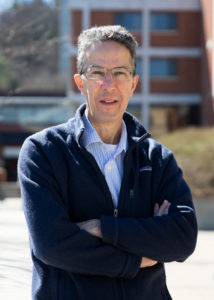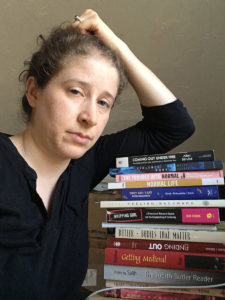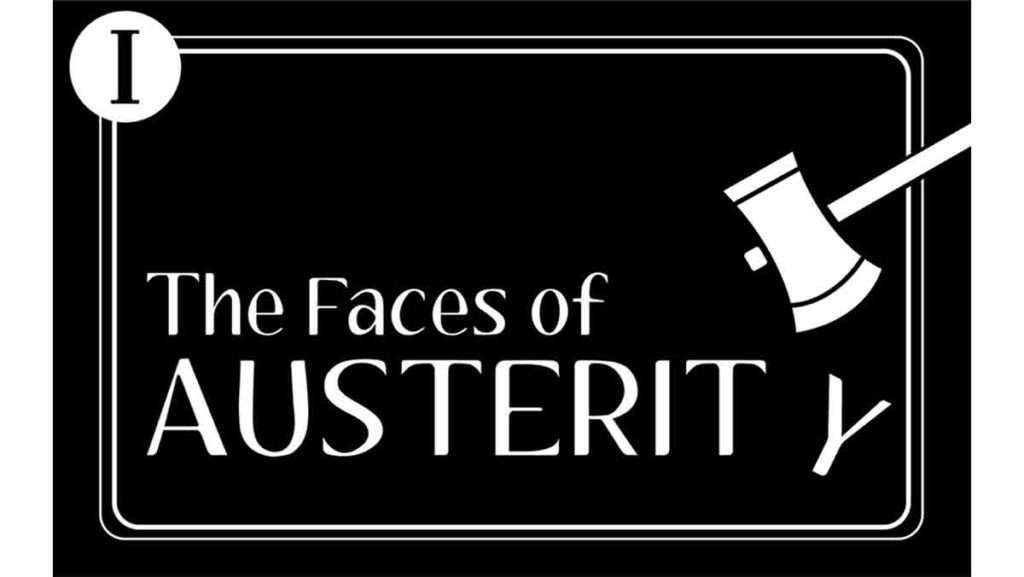
Model United Nations Adviser is Cut
Juan Arroyo, 57, is an assistant professor in the Department of Politics. He has taught at Ithaca College for 20 years, 15 of them full-time. Born in Spain, he came to the U.S. as a baby, and, because his father taught at Cornell University, he grew up in Ithaca. He is married to a nurse who works at the local hospital, and they have three children.
Arroyo has a Ph.D. in Comparative Politics from American University in Washington, D.C. Before coming to Ithaca College, he spent four years directing Cornell’s study abroad program in Hamburg, Germany. He continued working for the program when he returned to the U.S.
Arroyo said he knew he wanted to be a teacher since the age of seven and still loves it. His courses are mostly about European politics and international organizations.
A key part of his work since 2009 has been serving as the adviser for the college’s Model United Nations team. The students who participate in these national and international simulations are, he said, “a wonderful, eclectic group of people who are a lot of fun to work with, not just the obvious politics students. I will miss that a lot.”
A long-term and deeply important part of his life has been his involvement with St. Catherine of Siena, the Catholic Parish in northeast Ithaca, which has a sister community in the Dominican Republic. The Ithacans have contributed funds to support a school there, and the communities interact via the Internet. “But,” Arroyo said, “the power is often out.”
He also sings at the church, both with the choir and solo.
“I sing and I cook and I garden whenever I can,” he said. “I love to take walks and do fun things with my kids.”
He now faces a steep decline in family income and the possible loss of tuition remission for his kids. One daughter currently attends Ithaca College now, and his son received his acceptance letter three weeks after Arroyo was notified of his termination.
“Our family has planned around this for years,” he said. “The administration still hasn’t clarified what the terms will be.”
Of his own future, Arroyo said, “It’s going to mean upheaval, but I’m not going to let this torpedo my life.”
He said he felt that the administration is making a mistake regarding the college’s future.
“A decision was made in a very quick, almost panicky way using certain parameters, data and indicators and ignoring others,” Arroyo said. “As a professor, I would grade the APP process as an incomplete. No decision of any magnitude should be made so quickly, not in our personal lives, not for IC.”

1984 in Ithaca
Rachel Fomalhaut is a lecturer in the Department of Writing and in the Women’s and Gender Studies program. She is 40, the mother of a 3-year-old and identifies as queer and Jewish. She has taught at Ithaca College for nine years.
She has also taught at other area colleges. This semester, she is completing her doctorate in English at Binghamton University with a dissertation on loss and affect in multicultural women’s fiction. She has already published two academic articles.
Fomalhaut chaired the Contingent Faculty Union for three and a half years and has been part of the leadership team since it was founded. She also served on the Faculty Council as the sole representative of contingent faculty on campus for three years.
She has crossed many departmental and programmatic borders, serving as a First-Year Resident Experience Associate in the Office of Residential Life, tutoring in the New York State Arthur O. Eve Higher Education Opportunity Program and teaching writing sections of the Ithaca Seminar.
She has also taught Introduction to Women’s, Gender and Sexuality Studies and Queer Studies.
“Women’s and gender studies, based in an intersectional framework, is my favorite thing to teach,” Fomalhaut said.
Many students, she said, have expressed indignation that the college lacks a queer studies minor. “The majority of my students in both classes are women and/or queer folks looking for tools to understand their own circumstances and to help the communities they’re part of,” she said.
Fomalhaut’s partner lost his job in November due to the economic impacts of the COVID-19 pandemic.
“My income was never the primary one because I’m so low-paid,” she said. “Then my income became primary. And now, I’m fired.”
Luckily, she said, there is Medicaid and the privilege of having middle-class parents for help with the mortgage.
She said her long experience negotiating on behalf of the union has left her unsurprised about the administration’s unwillingness to collaborate with faculty. Still, she admitted, she did not know how bad it would get.
“It’s horrible to watch IC firing so many people during a health crisis while refusing to discuss alternative options, including proposals from the union that, at little or no cost to the college, would have helped to make this process more compassionate and humane for people,” Fomalhaut said.“Especially in the wake of the Trump era, with millions of people still devoted to him, to have this college that brands itself as liberal and progressive but with no analysis of power relations talking about ‘progress’ — it feels very 1984.”







